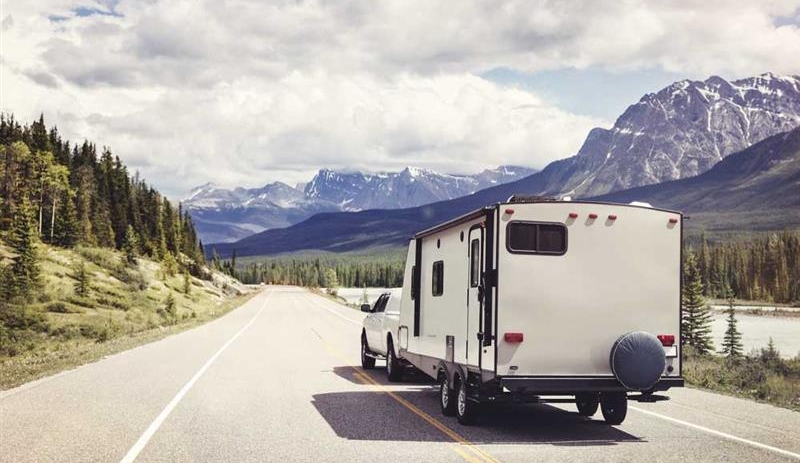
If you are not redirected within 30 seconds, please click here to continue.
Samedi: 10h – 16h HAE

If you are not redirected within 30 seconds, please click here to continue.
If you are not redirected within 30 seconds, please click here to continue.
Using a Trailer This Summer? Make Sure Your Car Insurance Is in Tow

- 33% of Canadians go camping annually, and of those who did in 2020, 50% intend to go camping again this year.
- In Ontario, when you hook up a trailer to your vehicle, whether you own the trailer or not, your insurer considers the trailer and car as one vehicle.
- If you want coverage for items inside the trailer, you should add it to your home insurance policy.
Summer beckons! Officially, the first day of summer is June 20, but with longer days and beautiful weather already here, many Canadians will be gearing up for a road trip to go camping, fishing, boating, RVing, or off-road biking.
According to the Canadian Recreational Vehicle Association, 33% of Canadians go camping annually, and of those who did in 2020, 50% intend to go camping again this year. Another 54% of Canadians who went camping last year say they intend to take longer summer sojourns in 2021.
If you count yourself among them, that might mean hitching a trailer to the rear of your vehicle to haul whatever it is you need to enjoy your escape to nature. But there's more to towing something behind your car than attaching a trailer hitch. You need to make sure you have adequate insurance coverage to keep your summer fun and worry-free.
Ask yourself: what would happen if the load you were towing behind your vehicle became unattached and ran out of control down the highway? Would your current car insurance policy cover you if someone got hurt? Would it cover damage to your trailer and its contents?
In general, when a non-motorized trailer is attached to your vehicle, your auto policy likely covers it to a degree. How much coverage you have for the trailer depends on your policy’s details.
In Ontario, when you hook up a trailer to your vehicle, whether you own the trailer or not, your insurer considers the trailer and car as one vehicle for third-party liability, accident benefits, and uninsured automobile coverages (three of four mandatory coverages in a standard Ontario auto policy).
For direct compensation-property damage (DCPD) – the fourth mandatory coverage type in Ontario – your policy will pay out for damage to a trailer under DCPD for a not-at-fault accident provided you own the trailer, no one lives in it, it is not used for business purposes, and it’s hitched to a vehicle weighing less than 4,500 kg. Also, if you have optional collision and comprehensive coverages as part of your auto policy, it does not extend to your trailer. You must buy those coverages separately for the trailer.
In Alberta, any trailer connected to your car will be treated as one vehicle and covered for third-party liability and accident benefits coverage if you file a claim. The two will be treated as separate automobiles to the limit(s) of liability under your physical damage coverage. As in Ontario, any physical damage to the trailer will not be covered.
Don't waste time calling around for auto insurance
Use RATESDOTCA to shop around, and compare multiple quotes at the same time.
Liability insurance coverage
If you are not worried about the trailer in tow or its contents, your existing auto policy may be enough to get you on the road. If anyone were harmed or anything were damaged as a result of your trailer while it was in transit, the liability portion of your policy would cover you.
If for some reason your trailer started rolling while it was parked in your driveway, your standard home insurance would most likely cover any resulting damage or injury. But check your property policy carefully as coverage for trailers may be excluded.
Utility or travel trailers
If you already have separate insurance for the contents in your trailer (like your ATV or canoe), or if you are transporting things with little value, you most likely can get by with the least expensive alternative – adding coverage onto your car insurance policy.
Tent trailers and "live-in" trailers
If you want coverage for items inside a tent trailer, you should add it to your home insurance policy. That way, your home insurance extends to the contents inside the trailer, and you would be covered if anything inside it was damaged or stolen. But be advised this type of coverage usually does not apply if the trailer is being used as a permanent residence.
RV or fifth-wheel vacation trailer
If you own a RV or fifth-wheel vacation trailer that contains appliances and other expensive items, your best bet is to purchase a separate RV and trailer insurance policy. This type of policy has all the coverage you need for your personal belongings, and you can also customize the coverage based on the replacement value of your unit.
Boat trailers
When arranging to insure a boat, trailer coverage is included as part of the deal. But you should always check your policy to make sure you know what's covered and if there are any limits to that coverage. If you are not covered, a boat trailer is like a utility or travel trailer. Your least expensive insurance alternative may be to add it to your car insurance policy.
Get money-saving tips in your inbox.
Stay on top of personal finance tips from our money experts!










